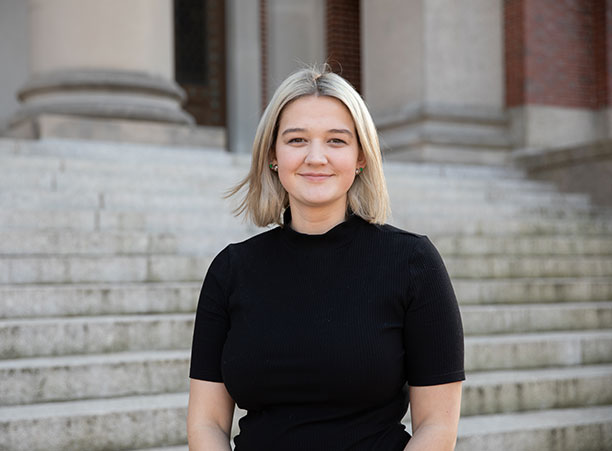
As a classics and history double major at College of the Holy Cross, Emma Powell '20 knows how significantly the power of memory affects both the present and the future.
Powell earned the Maurizio Vannicelli Washington Semester Away Program Award for her thesis on the historical memory of African American history, "A Remedy for the Past, If Only We Can Remember." To a crowded Rehm Library, Powell recalled how she researched the design and impact of two prominent Civil Rights memorials in the United States: the Martin Luther King, Jr. Memorial in Washington, D.C. and the National Memorial for Peace and Justice in Montgomery, Alabama.
The Vannicelli Award, named for the late Holy Cross political science professor and Washington Semester director Maurizio Vannicelli, is given each semester to the student who produces the best thesis during the Washington Semester Program.
During her semester in Washington, Powell interned at the Smithsonian Institute, working in their Travelling Exhibition Service on an exhibition highlighting influential leaders of the Civil Rights Movement. She was inspired through this work to focus her research on the memory and legacy of the struggle black Americans have gone through to earn recognition and civil rights in American history.
"How do we as a nation hold ourselves accountable for the past?" Powell asked.
Powell spoke at length about the impact that racial injustice, discrimination and violence have left on American history and how memory can be used to heal some of these deeply entrenched wounds. In her presentation, Powell demonstrated how each piece of monument planning and design holds the power to decide who and what is remembered in the national dialogue.
"The most important lesson that has come from my internship is that every choice to include or exclude any small piece of content says something," Powell said.
Powell ended her talk by arguing for greater recognition and representation of African-American history as part of the national memory presented in the Nation's capital.
"It's an issue of national identity. It's something we need to claim as a nation, and until we do that, I think we won't be truly moving toward racial justice."
Holy Cross Senior Emma Powell '20 Presents Award-Winning Thesis on Repairing Racial Injustice in America
The talk was inspired by her internship working at the Smithsonian Institute researching and remembering the Civil Rights Movement

